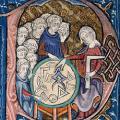227. Stayin’ Alive: Thirteenth Century Psychology
John Blund and William of Auvergne draw on Aristotle and Avicenna to argue that the soul is immaterial and immortal.
Themes:
• R.J. Teske (trans.), William of Auvergne: The Soul (Milwaukee: 2000).
• D.A. Callus and R.W. Hunt (ed.), M.W. Dunne (trans.), John Blund: Treatise on the Soul (Oxford: 2013).
• M. Bieniak, The Soul-Body Problem at Paris, ca. 1200-50: Hugo of St-Cher and his Contemporaries (Leuven: 2010).
• R.C. Dales, The Problem of the Rational Soul in the Thirteenth Century (Leiden: 1995).
• S.W. de Boer, The Science of the Soul: the Commentary Tradition on Aristotle’s De anima, c. 1260-c. 1360 (Leuven: 2013).
• D.N. Hasse, Avicenna’s De Anima in the Latin West (London: 2000).
• L. Schumacher, Human Nature in Early Franciscan Thought: Philosophical Background and Theological Significance (Cambridge: 2023).
• E.A. Moody, “William of Auvergne and his Treatise De Anima,” in Studies in Medieval Philosophy, Science and Logic (Berkeley: 1975), 1-109.
• R.J. Teske, “William of Auvergne on the Individuation of Human Souls,” Traditio 49 (1994), 77-93, reprinted in Teske, Studies in the Philosophy of William of Auvergne, Bishop of Paris (1228-1249) (Milwaukee: 2006).







Comments
Take my body, give it the *mind* to funk with the rest!
It is hard to overstate how much I delighted in the P-Funk focus of this episode...
In reply to Take my body, give it the *mind* to funk with the rest! by Chike
P-Funk
Good! I was pretty delighted too, writing it, and there's more to come in the next episode. (We will return the podcast to you as soon as you are groovy.)
Funky philosphy !
G'Day Peter,
This episode is my favourite ever, due to the masterful way you weaved the "funk" and "soul" puns/similies into the philosophical treatises and personalities. This will be an episode I listen to a few times, as I keep laughing over the important history bits !
Thanks again for the best philosophy lesson I have come across, including the few years of philosphy classes at university back in the grungy 90s.
All the best to you and yours,
Brett
In reply to Funky philosphy ! by Brett Harris
Make it funky
Thanks, glad you liked it. I suspect quite a few people listening who have never heard of P-Funk were like, "uh... what?" So it's good to know some people enjoyed it. By the way it might make a good double-feature with the old episode on Aristotle on soul, which is full of James Brown references.
soul
I prefer Sam and Davies Im a soul man. George Clinton has subsance but for me in essence lacks soul.
Simply To Be
“For instance, it is one thing for me simply to be and another for me to be human.” (10:29) Imagine that! I can't. I try to think of myself or Edward Abbey or even Peter's non-existent sister as simply being. [Sorry, I didn't catch her name, probably because I can't find her philosophy podcast.] I'm trying to think of each of them without thinking of them as human, or solitude-seeking, or even having a name or whatever. I come up extremely short and empty-handed. Of course, just because I can't imagine or understand or intellectually grasp how some being can be without being some thing or other, it still might be so. How so?
Minor error spotted
Small error at 16:40: you say "the body is nothing but an external tool for the body", when obviously you meant "for the soul".
In reply to Minor error spotted by Jean-François Virey
Body and soul
Wow, thanks! Just in time, I am revising the manuscript for the book version and it is wrong there too, so I have fixed it. Glad you were listening so carefully.
outside impact and soul?
This is the funniest episode I have listened to. Did any of these philosophers address the tension between claiming that the environment could impact a soul that has faculties and claiming that the soul is a perfect divine entity?
In reply to outside impact and soul? by Aviva
Soul and environment
Oh yes, that is a very long running problem and goes back at least to Plotinus who wrote a treatise on why the soul is not affected by anything bodily. As it happens we're just working on an episode about the African/German philosopher Amo, who wrote a treatise on the same issue. And it goes through the whole scholastic tradition into Amo's period of early modernity.
Glad you liked the episode!
Typos
Hi! Just a quick note to correct two typos: the author of "The Soul-Body Problem" is Bieniak, not Bienak, and the book was published in 2010, not in 1974, which was long before the author was born ;)
In reply to Typos by Magdalena Bieniak
Typos
Wow, thanks for that correction for the most authoritative of sources! Sorry to misspell your name. I have fixed it now.
Add new comment